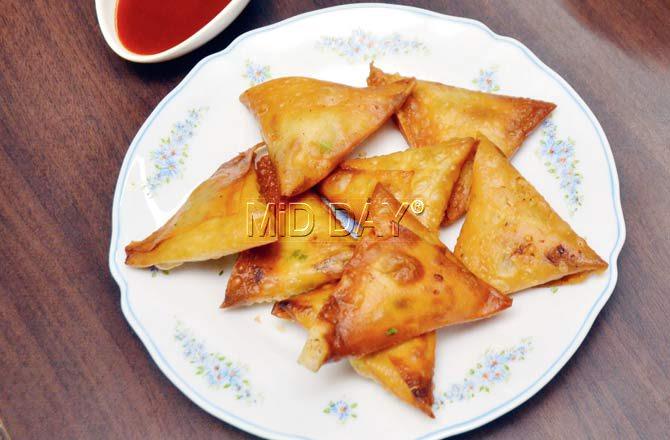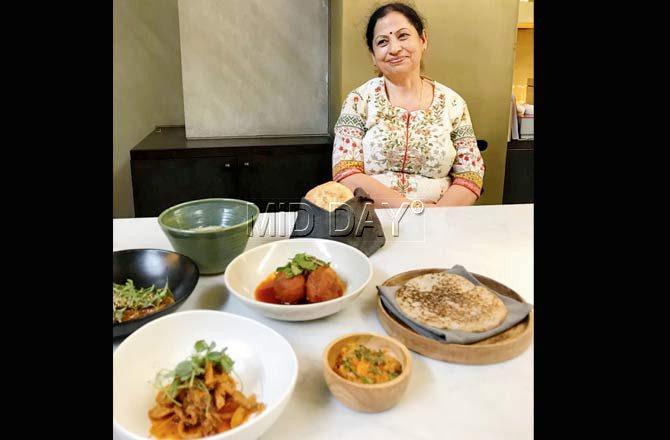Long before they entered culinary schools, chefs learned from their mothers. We dine at the homes of a celebrated few, with meals prepared by the best cooks they know

Jaina Somaiya and Chef Siddharth Somaiya
A fortnight ago, Chef Prateek Sadhu, from Masque, Mahalaxmi, invited his first mentor, his mother, Tejalahori, into his kitchen to cook a special meal for his guests. Prateek, who borrows liberally from his mother's recipes, says over the phone, "This dinner was a tribute to her cooking, as my love of food primarily comes from her." Tejalahori had cooked a traditional Kashmiri meal, with crowd favourites such as dum aloo, rajma, guchiya and paneer, and Prateek's favourites such as rogan josh, yakhni and fish.
ADVERTISEMENT
"She makes rogan josh with oil and yoghurt, no water," he says. "It's surreal." For the diners, the idea seemed to be: if you like Prateek's rogan josh, wait till you try his mother's. You can draw a line from what the best chefs cook today with what their mums spoon-fed them 30 years ago. Palates, like memories, stick. So, if pastry chef Husna Jumani's creations at The Clearing House, Fort, seem out of the box (chocolate ginger soil, moringa truffle), it's probably because her mum, Hadiya's kitchen staples are actually brilliant innovations.

Pastry chef Husna Jumani with her mum Hadiya at their Khar home
Husna's mum prepared a four-course meal for us at her house in Khar, which included roti-boti (layers of mutton masala, curd and fried khamiri rotis, or "Muslim nachos," according to Husna), chicken and cheese samosas, and a pineapple halwa — the base of which was grated pineapple, held together with Milkmaid — with a generous topping of shaved almonds and raisins, and a touch of saffron and nutmeg. We took extra servings home. They were delish even as leftovers.
Learn by osmosis
Since kids learn most from their parents by observing them, chefs pick up their earliest skills just by hanging out in the kitchen. Chef Siddharth Somaiya, who runs Goyaa in Byculla, says, "While growing up, I have seen my mum spend a lot of time in the kitchen: breakfast, lunch, dinner, tea in the afternoon. So, she would make us [his sister and him] sit on the platform and just keep talking, because that was her way of making us who we are today."

Chicken and cheese samosas. Pics/Datta Kumbhar
His mum, Jaina, who had prepared a largely Gujarati meal for us in their Colaba home, says, "It was never baby talk. I thought that whatever I was telling them was getting absorbed in some way." Subconsciously, Siddharth also imbibed her discipline. "One of the biggest things that comes from mum is the amount of hours [she spent in the kitchen], the effort, that standing. I've seen a lot of my friends' mothers, and they would just sit like queens," he says. "Today, even in the restaurant, I'd much rather tell my cooks to take a back seat. I am the first one to work and the last one to leave. So, that work ethic comes from her."
Husna, who had a similar experience, recalls, "At any point of time I'd come home, mom would be in the kitchen." Again, she was being nudged towards baking because of what was being made at home. "I used to make a lot of chocolate mousse, Black Forest cakes and brownies," says Hadiya. "The kids used to help with the batter; licking the bowls was their favourite thing at that time." Hadiya also gifted Husna a Tarla Dalal book, Cooking With Kids, when she was nine years old. "I just read the recipe, went to the kitchen and made banana muffins," remembers Husna. That was her first solo dessert.

Chef Prateek Sadhu's mum, Tejalahori, at Masque, Mahalaxmi
Food for the family
Because every family passes the baton of the rolling pin from one generation to another, the role of matriarchs is equally prominent in their stories. "[More than my mother], the bigger influence on me was my grandmother," recalls Hadiya. "I used to go to bazaars with her, and use the silpatta [grinding stone] to grind masalas with her." Jaina, who is Sindhi, was taught how to cook by her mom-in-law. "I had to learn cooking [after I got married]. I could just boil water," she says. "I came into this real traditional Gujarati household, where they expected the bahu of the house to do everything. I started from scratch and learnt a lot along the way. I realised then, how important food was to bring the family together, and to eat the food that has been cooked in your kitchen, rather than ordering from out."
Since Siddharth's grandmother ran the kitchen with an iron hand, a few things were strict no-nos. "Maggi was a cardinal sin," he says. "White bread was blasphemous. We never bought maida. Bengali mithais were [considered] unhealthy." The spectre of those taboos is present in his kitchen today. "There are literally zero processed foods in the kitchen," he says. "I make everything from scratch, from breads to tofu to marshmallows. It is just a conscious movement that was instilled from day one."
Along with the kitchen, the other important place for them has been the dining table. Sundays at Hadiya and Husna's place are celebrated with a lavish spread. "I have enough cutlery to feed 50-60 people," says Hadiya. "We have a big family, and we keep having dawats all the time." Jaina says, "It is family time for us. We sit at the table after the meal is over, hands dried up with food, and just talk about the day. You want to share the events of your life. [That's why] this table is a very sacred place for us."
Catch up on all the latest Mumbai news, crime news, current affairs, and also a complete guide on Mumbai from food to things to do and events across the city here. Also download the new mid-day Android and iOS apps to get latest updates
 Subscribe today by clicking the link and stay updated with the latest news!" Click here!
Subscribe today by clicking the link and stay updated with the latest news!" Click here!






